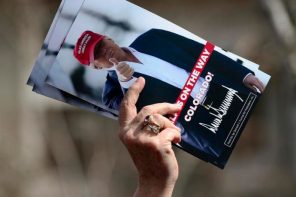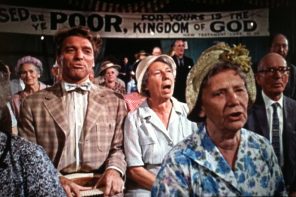Ever since the Democrats decided to compete for the religious vote using express references to religion, I figure that either God’s heart must be breaking or else She must be just bent over laughing at the folly of it all.
Not that I can blame Democrats for wanting to compete. In American political life it is obviously unhelpful to be viewed as the party of godlessness—everyone gets that. But it’s the how of appealing to the godly that ought to compel a bit more scrutiny, because how these appeals are being conducted now, and by both parties, does not make for an edifying spectacle.
Spurred on by Fox News, Republicans had been carping, even crowing, that the Democratic platform didn’t mention God even once, whereas theirs cites the Almighty ten times. But a Democratic spokesperson countered that the word “faith” appears 11 times in the party’s platform; “religion” or “religious” nine times; “church” two times; and “clergy” one time. RD’s Peter Montgomery updated the score in these pages yesterday.
Consultant Burns Strider, who largely makes his living helping Democrats talk the talk, made the whole affair in Charlotte sound like one big prayer meeting. After noting that he’s “not into word counts,” Strider still found it necessary to remind readers that the platform was, in fact, amended by voice vote to include the word “God.” So there! Blogging on the Washington Post website, Strider wrote that the convention was “robust with opportunities for the faithful to join in reflection and worship as well as meet, coordinate and plan how we best share our testimonies with other people of faith around the nation.” Strider even insisted that the Democrats, unlike You Know Who, grasp that faith without works is dead; he writes that the real story of Charlotte is of a “party that lives what it preaches.”
Well, yes and no. It’s a party that gives Elizabeth Warren a microphone even as it dispatches Rahm Emanuel to make nice with the very same fat cats Warren denounces; that lurches to proclaim Jerusalem the one and only capital of Israel even when it knows how catastrophically wrongheaded this is to the cause of justice and peace in the Middle East; that is quite obviously afraid to talk candidly about grinding poverty in America for fear of shattering the illusion that we’re all just middle-class folks about to recover fully from a GOP-induced hangover; and one that showcases Sr. Simone Campbell in prime time (“I AM my sister’s keeper, I am my brother’s keeper!”) but that also makes sure she adds that her critique of the Ryan Budget is fully aligned with the views of the U.S. Conference of Catholic Bishops. Delegates gave Campbell a rousing cheer without, I think, quite realizing just how constrained she was and just how much her speech was meant to show her fealty to the same bishops who are still dissing Obama over the Affordable Care Act.
Overall, the many references to divinity this week were of a piece with a thoroughly scripted pseudo-event: an event intended to link Democrats in voters’ minds with nice images of nurturing moms (who also hold up half the sky), heroic auto workers, and tough-minded decisive leaders who nevertheless care about the little guy. All of it spread on a mile wide and about a micron thick, including the faithiness part.
NARAL’s Nancy Keenan got off a good faithy line when she said that family planning decisions should be left to “a woman, her family, and her God.” Unfortunately, Keenan’s formula, possibly suggested to her by party staff, illustrates why merely adding a dollop of religiosity doesn’t work. What viewer, what proverbial undecided voter who goes to church and who holds residual worries about “abortion on demand,” is going to do anything but snort in derision when the head of the nation’s strongest abortion rights group drops God’s name into a convention speech?
In that regard, Ted Strickland, a certified Methodist preacher, was on somewhat better ground actually quoting Matthew 6 and denouncing Romney as someone whose riches have hardened his heart and distanced him from any identification with the Reign of God, in which those who are now first will be last, and vice versa. To me at least, the cringe factor over creeping religiosity was mitigated by the broader populist appeal, the volcanic “us vs. them” core, of Strickland’s stemwinder.
But even here we encounter a big problem—THE big problem—with regard to religion’s “role” in national politics. All the faithy gesturing and posing, all the invocations of God’s name and snippets of the Bible and Nuns On the Bus and what have you, can’t really help the Democrats so long as the larger religiously-tinged framing about what’s good and what’s bad remain untouched.
Let’s stick with the Strickland speech for a minute. His framing derives from the prophetic or progressive wing of mainline Protestantism: a noble and important tradition in multiple ways, and one that people like me strongly identify with. But note the qualifier: people like me. Mainly people of a certain age and a certain type of intellectual and theological trajectory. People who think the most important “religious” words uttered during the entire convention were the President’s own impassioned words about the privilege and duty and promise of common citizenship.
What needs to be faced is that Strickland’s framing of what God and the Bible are about is a framing that has been in steady retreat for about four decades. It’s not the Democratic Party’s fault, obviously. It’s what Robert Bellah and, more recently, Robert Putnam, have been trying to tell us: our well of religiously-informed civic capital has been drying up, and (as we used to say on the farm), you don’t miss the water till the well runs dry. No amount of posturing, no airbrushing over the reality of an atomized society, can change this.
I’m not counseling despair here. I think our stores of positive social capital can be replenished. If nothing else, the climate crisis will soon cause us to re-think our devotion to the unofficial American religion of acquisitive individualism. So will the frustration of our best and brightest young people following all the rules for individual success and still finding themselves working unpaid internships in a an economy that grows increasingly incapable of rewarding their efforts. Inspired religious leadership during the upcoming disruptive period may help in creating a new ethical and civic framing that really does have a communitarian center. But this will be a 20- or 30-year process, and in my view it’s a process that is actually hindered by the politics of illusion abetted by a gauzy religiosity.
So my unsolicited word of advice to faithy Democrats: Go ahead and sing “Blessed Be the Ties That Bind” as loud as you want. I’ll sing right along with you. But if the ties aren’t really there, it won’t make a damned bit of difference.



